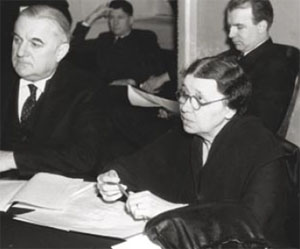国務省出版物
女性実力者の系譜-政府における女性の役割 「ハティー・オフィーリア・ワイアット・キャラウェイ」

ハティー・キャラウェイ上院議員。左はジョセフ・ガフィー上院議員。1936年2月26日にワシントンDCで開かれた上院委員会の公開会合で、女性初の議長を務めた。
連邦上院議員に選ばれた最初の女性
1878年2月1日生まれ、1950年12月21日死去
ジャネット・ランキンは、1917年4月2日に連邦議会下院で議席を獲得した。両院を通じて選出された初の女性議員だった。全米の女性が投票権を獲得する3年前だった。
ハティー・キャラウェイは、自分自身の力で米国上院に選出された初めての女性である。
彼女はテネシー州出身で、ディクソン・ノーマル・カレッジで学位を取得した。そこでサディアス・H・キャラウェイと出会って1902年に結婚し、3人の息子をもうけた。一家はアーカンソー州に移り住み、そこからサディアス・キャラウェイは1912年に連邦下院、1920年に連邦上院に立候補してそれぞれ当選した。1931年にサディアスが突然亡くなると、アーカンソー州のハービー・パーネル知事は、夫に代わってハティーを上院議員に指名した。1932年1月12日に特別選挙が行われ、彼女の指名が承認された。ハティー・キャラウェイが選出される前に1人だけ、レベッカ・ラティマー・フェルトンという女性が、やはり上院議員の死去により議員を務めたが、それは儀礼上の任命であり、1日限りのことだった。
自分の考えを遠慮なく口にするジャネット・ランキンと対照的に、ハティー・キャラウェイは、一度も演説をせず、また、大衆受けしない主義を主張することもなかった。彼女はそれほど自制していたため、「寡黙なハティー」というニックネームまでもらっていた。しかしながら、彼女は勤勉な公僕であり、自分の責任を重く受け止め、高潔という評判を確立した。民主党員である彼女は、退役軍人と労働組合のために、常にフランクリン・D・ルーズベルト大統領とニューディール法を支持した。
「寡黙なハティー」が沈黙を破って人々を驚かせたのは、1932年5月9日のことだった。上院で初の女性議長を務めるよう要請された彼女は、そのために集まってきた記者たちに対して、再選を目指して立候補すると発表した。彼女のために懸命に選挙戦を手伝ったルイジアナ州のヒューイ・ロング上院議員のおかげもあり、彼女は再選を果たした。1940年代には、男女平等憲法修正条項案の共同提案者として署名した。彼女はウィリアム・フルブライトに敗れて、1945年に上院を去った。いつもの控えめな表現で、彼女は自分が4位だったことを「国民の声です」と総括した。
しかし、ハティーの公職での経歴は終わらなかった。ルーズベルトは彼女を米国連邦労働者補償委員会に、そして後に労働者補償上告委員会に任命した。1950年1月、彼女は脳卒中に襲われて辞職し、その年の末に死去した。彼女の書いた手紙、そして彼女の在勤期間をたどる記録が、『寡黙なハティーが語る―ハティー・キャラウェイ上院議員の個人日記(Silent Hattie Speaks: The Personal Journal of Senator Hattie Caraway)』というタイトルで出版されている。
*上記の日本語文書は参考のための仮翻訳で、正文は英文です。
Hattie Ophelia Wyatt Caraway - Women of Influence
First woman elected to the U.S. Senate
(Born: February 1, 1878; Died: December 21, 1950)
Hattie Caraway was the first woman elected to the U.S. Senate in her own right.
A native of Tennessee, she earned a degree from Dickson Normal College. There, she met Thaddeus H. Caraway, married him in 1902, and had three sons. The family moved to Arkansas, where Thaddeus Caraway was elected to the U.S. Congress in 1912, and to the U.S. Senate in 1920. After he died unexpectedly in 1931, Arkansas Governor Harvey Parnell appointed Hattie Caraway to her late husband's seat. A special election January 12, 1932, confirmed her appointment. Before Hattie Caraway was elected, only one woman – Rebecca Latimer Felton – had served as a courtesy appointment for one day, also as a result of a senator's death.
In contrast to the outspoken Jeannette Rankin, Hattie Caraway made no speeches nor did she take on unpopular causes. Such was her restraint, as a matter of fact, that she earned the nickname "Silent Hattie." She was a diligent public servant, however, taking her responsibilities seriously and building a reputation for integrity. A Democrat, she routinely supported President Franklin D. Roosevelt and New Deal legislation on behalf of veterans and organized labor.
"Silent Hattie" spoke up and took everyone by surprise on May 9, 1932. Invited to become the first woman to preside over the Senate, she announced to the reporters gathered for the event that she was running for re-election. She won that election, thanks in part to Senator Huey Long of Louisiana, who campaigned hard for her. In the 1940s she signed on as a co-sponsor of the proposed Equal Rights Amendment. She left the Senate in 1945, after being defeated by William Fulbright. In a typical understatement, she summed up her fourth-place showing, "The people are speaking."
Her career in public service was not over, however. Roosevelt appointed her to the U.S. (federal) Employees' Compensation Commission and later to the Employees' Compensation Appeals Board. In January 1950, she suffered a stroke and resigned her post. She died at the close of that year. Her correspondence and other papers tracing her years in office were published under the title Silent Hattie Speaks: The Personal Journal of Senator Hattie Caraway.




